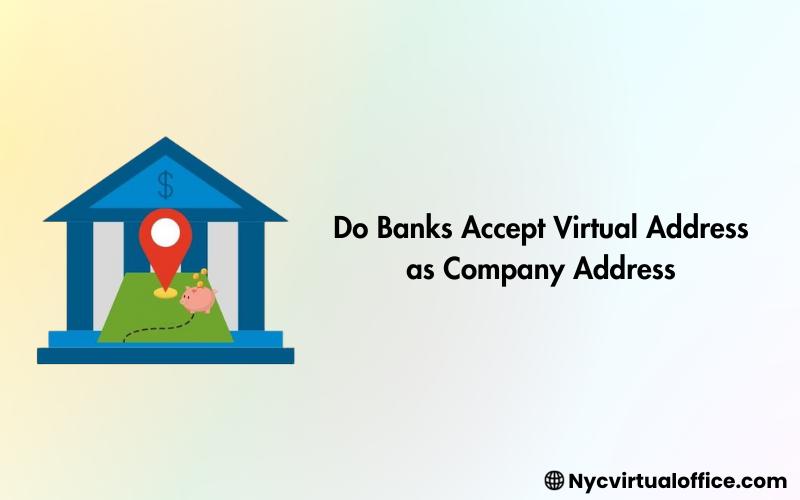In the present quickly developing business scene, the idea of a customary office space is changing. The ascent of remote work, new companies, and private ventures have prompted the developing prevalence of virtual offices.
A virtual office permits organizations to have a renowned address without the actual space, offering a financially savvy answer for keeping an expert picture. Regarding fundamental capabilities like banking, many keep thinking about whether banks accept virtual addresses as genuine organization addresses.
In this article, we will investigate the idea of virtual addresses, their advantages, and do banks accept virtual address for business purposes, zeroing in on Virtual Office Address NYC, for instance.
What Is a Virtual Address?
A virtual address, or virtual office address, is a help presented by outsider suppliers that permit organizations to involve a lofty actual address for accurate purposes without consuming the actual space.
These addresses are commonly situated in prime business regions, offering a quality of unique skill to organizations, particularly those simply beginning.
Benefits of Virtual Address
- Proficient Picture: A lofty address can assist with making an expert picture for your business, imparting trust in clients and accomplices.
- Cost Reserve funds: Virtual offices are savvier than renting office space, as organizations pay just for the address and related administrations.
- Mail Dealing: Mail dealing with Virtual office suppliers can get and oversee mail for organizations, guaranteeing significant documents are taken care of safely.
- Meeting Spaces: Some virtual office suppliers admit to meeting rooms or gathering offices, permitting organizations to meet clients or colleagues when required.
Virtual Office Address NYC: A Perfect representation
Virtual office administrations are accessible in different urban communities worldwide and are one of the most sought-after areas in New York City. The clamoring center of trade, culture, and money, NYC is a magnet for organizations trying to establish a presence at the core of the activity.
Virtual Office Address NYC offers organizations the chance to have an address in this incredibly famous city without the related expenses of keeping an actual office.
Benefits of Having Virtual Address NYC
- Credibility: NYC is synonymous with business excellence, and having an NYC address enhances your company’s credibility.
- Accessibility: It provides easy access to the city’s business and financial districts, fostering networking opportunities.
- Mail and Package Handling: Virtual office providers in NYC can receive and manage your mail and packages, ensuring nothing gets lost.
- Meeting Rooms: Access to meeting spaces in prime NYC locations can be invaluable for client meetings and presentations.
Do Banks Accept Virtual Addresses?
One of the most critical questions for businesses utilizing virtual addresses is do banks accept virtual address for official purposes.
This concern arises because banks often require a physical address to establish a business account. However, the answer is not a straightforward yes or no and depends on various factors.
Considerations To Keep in Mind
- Business Type: Your business can influence a bank’s decision. Established businesses with a history of using a virtual address may easily convince banks to accept it.
- Banking Institution: Different banks have different policies. Smaller or online-only banks may be more flexible in accepting virtual addresses than larger, traditional banks.
- Additional Documentation: Banks might request additional documentation to verify the legitimacy of your business, such as business licenses, tax records, and utility bills associated with the virtual address.
- Local Regulations: Banking regulations can vary by location, so you must check with banks in your area to understand their policies.
- Established Relationship: An existing relationship with a bank can make convincing them to accept a virtual address for your business easier.
Benefits of Using a Virtual Address for Banking
Despite the challenges, using a virtual address for banking has its advantages:
- Cost Savings: Virtual office addresses are more cost-effective than leasing physical office space, allowing businesses to allocate resources elsewhere.
- Flexibility: Businesses can change their physical location without the hassle of updating bank records, as the virtual address remains constant.
- Professional Image: A prestigious virtual address maintains a professional image even if the business operates remotely or from home.
- Convenience: Virtual office providers often offer mail handling services so that you can have essential documents and correspondence delivered securely.
Tips for Using a Virtual Address for Banking
To maximize the chances of banks accepting your virtual address, consider the following tips:
- Research Banks: Look for banks that are open to businesses with virtual addresses. Online banks and smaller institutions may be more receptive.
- Establish Legitimacy: Ensure your business is registered correctly and you have all the necessary licenses and permits.
- Choose a Reputable Virtual Office Provider: Opt for a reputable virtual office provider with a track record of assisting businesses with banking requirements.
- Maintain Consistency: Use the virtual address consistently across all business documentation, including your website, business cards, and marketing materials.
- Prepare for Additional Documentation: Be ready to provide any requested documentation to prove the legitimacy of your business and the virtual address.
To Sum It Up
In the age of remote work and virtual business operations, banks accept virtual addresses as company addresses is a valid concern. While the acceptance of virtual addresses can vary depending on factors such as the type of business and the banking institution. The benefits of using a virtual address for banking cannot be ignored.
Virtual Office Address NYC is a prime example of how businesses can benefit from a prestigious address in a global business hub. By following best practices and maintaining transparency with banks, businesses can successfully leverage virtual addresses to establish and maintain their financial accounts.
Also Read: What Is a Package Receiving Service?











